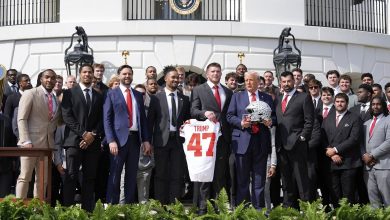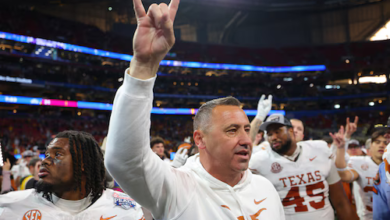West Texas A&M University president cancels student drag show, saying it degrades women

In a move that has sparked widespread debate and controversy, the president of West Texas A&M University (WTAMU) canceled a student-led drag show, citing concerns that the event “degrades women.” The cancellation, which occurred just days before the event was set to take place, has ignited conversations about freedom of expression, gender identity, the role of universities in promoting inclusive environments, and the intersection of conservative values with academic freedom.
At the heart of the matter is the tension between the administration’s decision to cancel the event and the student body’s desire to celebrate the LGBTQ+ community and showcase artistic expression through drag performance. This controversy raises important questions about the limits of institutional authority, the role of universities in fostering an inclusive and diverse environment, and the broader cultural debates surrounding gender and sexuality in the United States.
In this article, we will explore the background surrounding the decision to cancel the drag show, the response from various stakeholders, and the wider implications of this action. Through this examination, we will delve into the complexity of this situation and the ways in which it highlights the ongoing tensions between conservative values and the pursuit of inclusivity on college campuses.
Background: The Student-Led Drag Show at West Texas A&M University
The drag show in question was initially organized by a student group at West Texas A&M University, located in Canyon, Texas. The event was intended to be a celebration of drag culture, a vibrant and historically significant art form that has gained increasing recognition in mainstream media, particularly through shows like RuPaul’s Drag Race. Drag performances often involve individuals performing as exaggerated versions of gender roles, using costumes, makeup, and theatricality to comment on and challenge societal expectations of gender.
For many in the LGBTQ+ community, drag is more than just an art form—it is a means of self-expression and a way to reclaim and redefine gender. Drag shows can be seen as an opportunity to express individuality, explore different aspects of identity, and create a sense of belonging within a marginalized community.
The drag show at WTAMU was initially planned as a campus event that would include performances by students and members of the LGBTQ+ community. It was positioned as a celebration of diversity, inclusion, and artistic expression. However, the university administration, led by President Walter Wendler, decided to cancel the event, citing concerns about its impact on women’s rights and the potential for the show to undermine the dignity of women.
President Wendler’s Rationale for Cancelling the Event
President Walter Wendler, in an official statement, explained his decision to cancel the drag show by asserting that it “degrades women” and “undermines the dignity of the university.” He argued that drag performances, which often involve men dressing as women, can perpetuate harmful stereotypes about women and objectify them. Wendler’s statement included the claim that “drag shows are not a form of artistic expression,” but rather a form of “mockery” that reduces women to caricatures.
According to Wendler, such performances perpetuate a false and harmful image of femininity, suggesting that women are simply exaggerated, stereotypical versions of gendered norms rather than fully realized human beings with complex identities. He emphasized that West Texas A&M University, as a public institution, has an obligation to uphold certain moral values and protect the dignity of all individuals, including women.
The president’s comments reflect a conservative perspective on gender roles and the importance of preserving traditional values in the face of evolving societal norms. His decision to cancel the event is grounded in the belief that some forms of gender expression—specifically, drag performances—go too far in challenging traditional ideas about gender and identity.
While Wendler’s stance on the drag show has been described as an attempt to protect women’s dignity, it has also raised questions about the role of universities in supporting free speech, promoting inclusivity, and encouraging the exploration of diverse identities. His decision has been criticized by many for curbing student expression and reinforcing restrictive ideas about gender roles.
The Response from Students and the LGBTQ+ Community
In response to President Wendler’s decision, students, faculty members, and members of the LGBTQ+ community at West Texas A&M University have voiced their frustration and disappointment. Many students see the cancellation as an attack on their right to express themselves and celebrate their identities in an inclusive space. For them, the drag show was not just a fun performance, but an important opportunity to create visibility for the LGBTQ+ community and provide a platform for students to showcase their talents.
One student, who wished to remain anonymous, expressed the sentiment shared by many in the LGBTQ+ community: “Drag shows are not about degrading anyone—they’re about celebrating individuality and expression. This event was going to be a way for us to come together and share something beautiful with the campus community.”
Drag queen performances have historically been associated with resilience in the face of adversity, especially within the LGBTQ+ community. The act of dressing in drag often signifies a challenge to gender norms, and for many, it is an essential aspect of LGBTQ+ pride. Therefore, the cancellation of the event felt like a direct attack on a community that has already faced systemic discrimination and marginalization.
Student activists on campus quickly mobilized, organizing protests and social media campaigns in response to the cancellation. Many students expressed their belief that President Wendler’s decision was not only an infringement on free expression but also a sign of the university’s lack of support for LGBTQ+ students. They argued that the drag show was an important part of the campus culture and that shutting it down was indicative of a broader issue within the university system—a reluctance to embrace diversity in all its forms.
Faculty and National Reactions
The cancellation of the drag show did not only spark protests among students. Faculty members at West Texas A&M University also voiced their concern over the administration’s decision. Some professors, particularly those who teach in fields related to gender studies, sociology, and LGBTQ+ advocacy, argued that the cancellation undermines the values of higher education. In an open letter to the university’s administration, these faculty members argued that universities should be places where diverse perspectives are welcomed and celebrated, not suppressed.
One faculty member, Dr. Rachel Greene, a professor of sociology at WTAMU, expressed disappointment over the administration’s stance: “Universities should encourage critical thinking and create spaces where all forms of expression are respected. By canceling this event, the administration is sending the message that some forms of expression are not valued, and that is a dangerous precedent.”
National organizations supporting LGBTQ+ rights also took issue with President Wendler’s decision. Groups like the Human Rights Campaign and GLAAD condemned the cancellation as a violation of free speech and an attempt to silence LGBTQ+ voices. They argued that the decision sets a dangerous precedent for other universities across the country, particularly those in more conservative areas, and could lead to more restrictions on student expression and LGBTQ+ rights.
The controversy surrounding the cancellation of the drag show has garnered national media attention, with outlets such as The New York Times, CNN, and The Washington Post covering the story. In some of the coverage, the debate has been framed as a larger cultural divide between conservative values and progressive movements that push for more inclusivity and acceptance of nontraditional gender expressions.
The Role of Universities in Promoting Inclusivity and Free Expression
At the core of this controversy lies a fundamental question about the role of universities in fostering an inclusive environment. Universities are traditionally seen as places where diverse viewpoints can be explored and discussed freely. However, this ideal is often challenged when controversial issues arise, particularly in relation to topics like gender, sexuality, and identity.
Many argue that universities should prioritize inclusivity and diversity by providing students with opportunities to explore and express their identities in safe spaces. This includes supporting student-led events that celebrate LGBTQ+ culture and allow students to challenge societal norms. Conversely, others contend that universities should adhere to certain values and moral standards, and that some forms of expression—such as drag performances—may cross a line by perpetuating negative stereotypes or undermining traditional gender roles.
In this case, President Wendler’s decision reflects a belief that universities should preserve certain conservative values, even if doing so limits the ability of students to fully express themselves. This decision has reignited debates about academic freedom, the limits of free speech, and the role of universities in promoting a healthy and inclusive campus culture.
The Broader Cultural Debate: Gender, Identity, and Expression
The cancellation of the drag show at West Texas A&M University is emblematic of a broader cultural debate about gender, identity, and expression. As society continues to evolve in its understanding of gender and sexuality, traditional views on these subjects are being challenged more than ever. Drag performances, which have historically been a form of resistance to rigid gender norms, are now seen by some as a form of empowerment, while others view them as disrespectful or harmful.
The debate is particularly polarized in conservative areas, where many people continue to hold traditional views on gender and the roles that men and women are expected to play in society. Drag performances challenge these views by blurring the lines between masculinity and femininity and providing a platform for individuals to explore gender in creative and sometimes subversive ways.
At the same time, the increasing visibility of LGBTQ+ people and their expressions of identity is often met with backlash from those who feel that these changes undermine traditional values. The cancellation of the drag show at West Texas A&M University reflects this cultural divide and serves as a reminder of the ongoing struggles for equality, visibility, and acceptance within the LGBTQ+ community.









